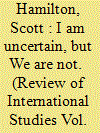|
|
|
Sort Order |
|
|
|
Items / Page
|
|
|
|
|
|
|
| Srl | Item |
| 1 |
ID:
159795


|
|
|
|
|
| Summary/Abstract |
Michel Foucault’s concept of governmentality is widely used throughout the social sciences to analyse the state, liberalism, and individual subjectivity. Surprisingly, what remains ignored are the repeated claims made by Foucault throughout his seminal Security, Territory, Population lectures (2007) that governmentality depends more fundamentally on a specific form of time, than on the state or the subject. By paying closer attention to Foucault’s comments on political temporality, this article reveals that governmentality emerged from, and depends upon, a very specific cosmological order that experiences time as indefinite: what Foucault calls our modern ‘indefinite governmentality’. This is elaborated here in three ways. First, by reviewing the transformation from a linear Christian cosmology to our modern indefinite governmentality through what Foucault calls the ‘de-governmentalization of the cosmos’. Second, by arguing that our experience of indefinite temporality was concretised by the geological discovery of ‘deep time’. Third, by engaging a contemporary geological concept that returns humanity to its lost cosmological centrality, thereby re-governing the cosmos: the Anthropocene, or the ‘human epoch’. Analysed using indefinite governmentality, Foucault’s forewarning of an ‘end of history’ is implicit in the new concept of the Anthropocene’s origins and ends. If it is the paradigm shift its proponents claim, then it threatens to end the temporality of the state, the subject, and governmentality itself.
|
|
|
|
|
|
|
|
|
|
|
|
|
|
|
|
| 2 |
ID:
168867


|
|
|
|
|
| Summary/Abstract |
The concept of ‘the Anthropocene’ as a new human-induced geological epoch has made its way into IR. Debates have recently arisen between ‘post-humanists’ stressing its destruction of subject-object binaries and ‘New Anthropocentrists’ arguing that it increases the importance of the human being as planetary steward. This article moves beyond these debates to question a strange but unexplored foundation that underlies the basic discourse of the Anthropocene: the assertion that humanity must be grouped together as a collective species, ‘anthropos’, or planetary ‘We’. Using the philosophy of Martin Heidegger, it argues that the Anthropocene reveals a new and deeper shift in human subjectivity, moving from an individualistic Cartesian ‘I’ to a collective and planetary ‘We’. This argument is made in three steps. First, today's common treatment of humanity as a collective whole in Anthropocene literature is examined. Second, it details how transformations in subjectivity occur by shifting the historical boundaries of our most fundamental notion of certainty – the ‘subiectum’ – and how the technologies of Earth System Science (ESS) subtly facilitate this shift today. Finally, the article argues how this subjective transformation from the ‘I’ to the ‘We’ results from the temporal, spatial, and existential incalculability and uncertainty of the Anthropocene, thereby fostering the rise of certainty in new forms of conflictual identity politics.
|
|
|
|
|
|
|
|
|
|
|
|
|
|
|
|
|
|
|
|
|